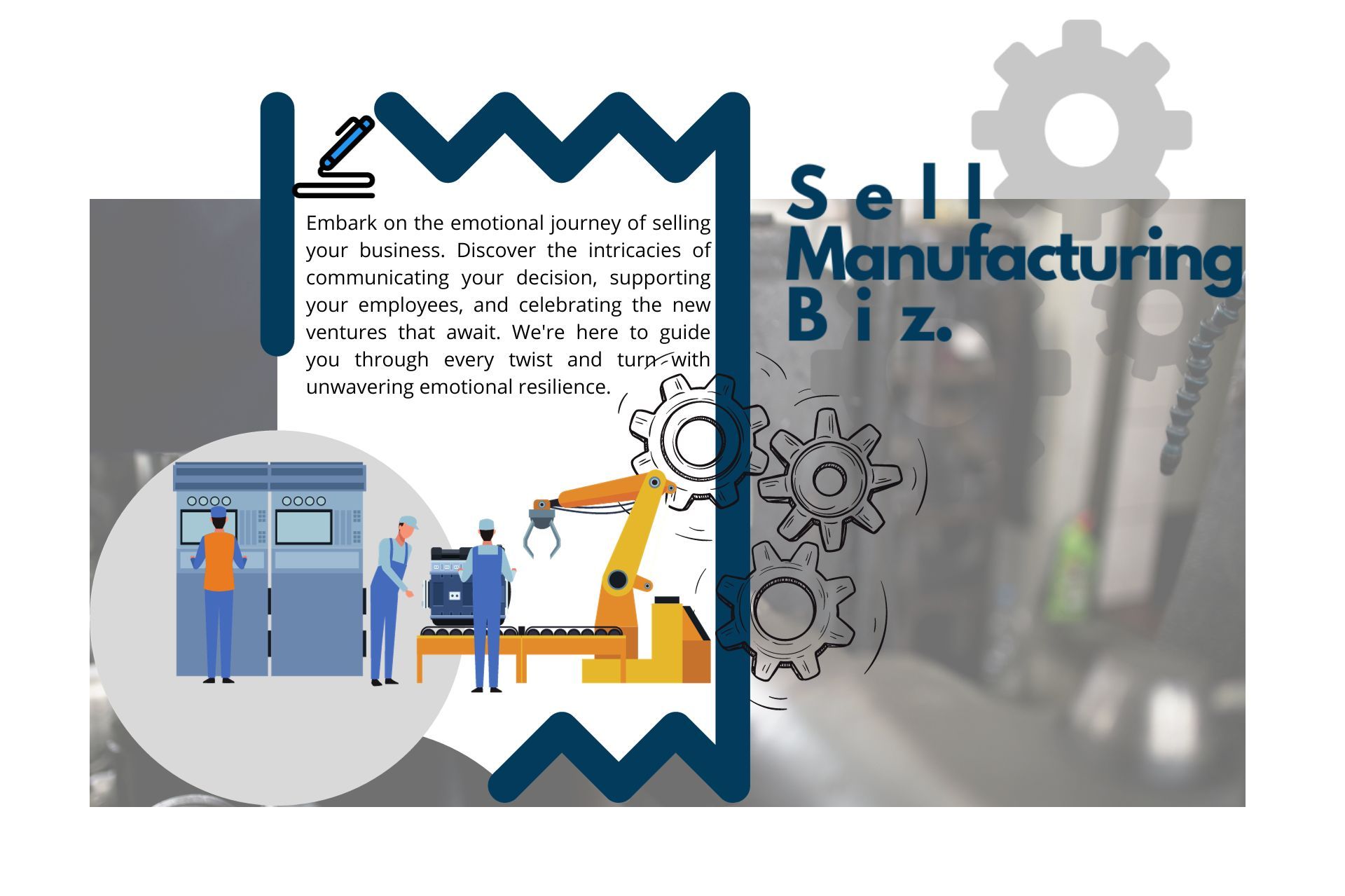The Challenge of Communication: Sharing Your Decision With Your Clients
How to Communicate the Decision of Selling a Business with Clients Example
Embark on the emotional journey of selling your business. Discover the intricacies of communicating your decision, supporting your employees, and celebrating the new ventures that await. We're here to guide you through every twist and turn with unwavering emotional resilience.

The decision to sell your business is not one to be taken lightly. It signifies the end of an era, not just for you, but for all those who have been part of your journey – your loyal clients, employees, and partners. Communicating this decision is a significant emotional challenge, and it's crucial to handle it with care and empathy.
The Emotional Aspects of Notifying Your Clients
For many business owners in Ontario's manufacturing space, their clients aren't just transactions; they're relationships built on trust and mutual respect. The thought of breaking this news to clients can be emotionally daunting.
I remember a manufacturing business owner I worked with, let's call her Emily, who had cultivated deep connections with her clients over the years. She ran a machine fabrication shop, and her customers weren't just a means to revenue; they were partners in her design and engineering journey. When she decided to sell the CNC shop in Toronto, she was overwhelmed by the thought of how her customers and clients would react.
In Emily's case, we devised a strategy that focused on transparency. We decided to meet with each client individually to discuss the transition. Emily shared her reasons for selling and assured them that their projects would be handled with the same care and dedication. The response from her clients was mixed, but what stood out was the appreciation for her honesty.
Emily's case underscores the emotional burden of notifying clients. It's not just about the business; it's about the relationships you've nurtured. The process can be emotionally taxing, but with the right approach, it can also be an opportunity to strengthen those connections.
Strategies for Effective Client Communication
Here are some strategies to help you navigate the emotional landscape of notifying your clients:
1. Transparency:
Honesty is paramount. Explain your reasons for selling and assure your clients that their needs will continue to be a priority.
2. Individual Meetings:
Whenever possible, meet with clients individually. This personal touch can go a long way in addressing their concerns and emotions.
3. Continuity Assurance:
Reassure your clients that the quality and dedication they've experienced will remain unchanged under the new ownership. Share the background of the new owners and their commitment to excellence.
4. Adequate Notice:
Provide your clients with sufficient notice before the transition. This allows them time to adjust and seek alternatives if they choose to.
5. Stay Connected:
Offer the option to stay connected personally or through your professional network. This can help ease the transition and maintain those valuable relationships.
Supporting Your Employees Through the Transition
Just as notifying clients is emotionally charged, addressing your employees is equally complex. Your team has likely been an integral part of your business journey, and their emotions and livelihoods are closely tied to the business's fate.
Consider the case of John, who ran a successful manufacturing company. When he decided to sell, he faced the challenging task of communicating this decision to his employees. John saw them as a family, and the thought of disrupting their lives weighed heavily on him.
In John's scenario, we focused on creating a transition plan. We ensured that his employees' jobs were secure under the new ownership, and they were offered fair compensation packages. John held a meeting with his team, where he expressed his gratitude and shared the reasons behind the sale. He emphasized that their well-being was his priority.
The emotional response from his employees was a mix of understanding, sadness, and uncertainty. Still, John's commitment to supporting them through the transition made a significant difference. The support he provided, both emotionally and practically, showcased his dedication to their welfare.
Strategies for Employee Support
Navigating the emotional terrain of supporting your employees involves strategies such as:
1. Clear Communication:
Hold a transparent meeting with your employees to share the news and your reasons for the sale. Ensure they understand the process and their role in it.
2. Job Security:
If possible, secure your employees' jobs under the new ownership. Share information about the new owners and their commitment to the team.
3. Fair Compensation:
Provide fair compensation packages. This may include severance pay, benefits continuation, or other arrangements to ease the transition.
4. Emotional Support:
Be available for your employees to address their concerns and provide emotional support during this challenging time.
5. Maintain Connections:
Offer the opportunity to stay connected personally or through professional networks. This can help them in their job search or transition to the new ownership.
Celebrating New Ventures: The Next Chapter Begins
While parting with your business can be emotionally taxing, it also marks the beginning of new possibilities. Just as our journey started with acknowledging the emotional challenges of letting go, it continues with embracing the opportunities that lie ahead.
After successfully selling his design and engineering robotics company, David embarked on a new venture. He chose to explore the world of mentoring and coaching in the tech and
industrial industry. David realized that he could channel his expertise and experience into helping the next generation of tech entrepreneurs. His decision to sell his business wasn't an end but a transformative beginning.
For many business owners, the post-sale phase opens doors to exciting new chapters. It's a time to reflect on your accomplishments and set your sights on fresh horizons. Embrace the future with the same passion and commitment that drove you in your business.
Strategies for Celebrating New Ventures
Here are some strategies for celebrating the start of your new journey:
1. Reflect on Achievements:
Take time to acknowledge your accomplishments and the impact you've had in your industry.
2. Set New Goals:
Define new goals and aspirations for your post-business life. It could be in the form of a new business venture, a different career path, or personal endeavors.
3. Learn and Grow:
Continue to develop yourself both personally and professionally. Consider further education, training, or pursuing interests you didn't have time for before.
4. Networking:
Stay connected with your professional network. New opportunities often arise through connections and collaborations.
5. Enjoy Life:
Embrace a work-life balance that allows you to enjoy life outside of the business world. Spend quality time with family and friends and pursue hobbies and interests that bring you joy.
We Are Here for You
The emotional journey of selling your business is a testament to your dedication and the profound connection you have with what you've built. It's a rollercoaster of emotions, from the decision to sell to the final transition. We understand that your business is not just a venture; it's a piece of your heart and soul.
As we navigate the intricate emotional terrain together, remember that you're not alone. Your emotions are valid, and we are here to support you. We understand that selling your business is not just a transaction; it's a personal journey. It's about finding the right balance between emotions and practicality, and we're here to help you achieve that balance. Every twist and turn in this journey will be met with our unwavering support and emotional resilience.
In the upcoming sections, we will delve into the nuances of celebrating your new ventures, the joys of work-life balance, and staying connected with your professional network. Your emotional journey is an essential part of this process, and we're committed to supporting you every step of the way.
Stay with us as we continue to explore the emotional landscape of selling your business in Ontario, ensuring your emotions are acknowledged, and your journey is one of tears and triumphs. Remember, you're not alone on this path.
Selling Your Manufacturer Now?
If you are a retiring business owner looking to sell your business in Ontario, here are six tips to get you started:
1. Plan for your exit. Selling a small and medium size machine shop business in Ontario can take a long time, so it's important to start early and have a clear strategy.
2. Know your objectives and expectations. What are you looking for in a buyer? What are your financial and personal goals? How much are you willing to compromise?
3. Understand your company's value. This is a crucial step to take when planning to sell your manufacturing business in Ontario. You need to know how much your business is worth and what factors influence its valuation.
4. Find the right buyer for your business. There are different types of buyers in the market, such as strategic buyers, financial buyers, or individual investors. You need to find the one that matches your criteria and has the resources and expertise to close the deal.
5. Be ready for due diligence. This is when buyers will want to know everything about your business, from its financial performance to its operational processes. You need to be prepared to provide accurate and complete information and answer any questions they may have.
6. Be flexible and open-minded. Negotiating a deal can be challenging and complex, so you need to be willing to adapt and compromise on some aspects of the deal.
We are a deal team of sell-side M&A advisors, also known as Canada's manufacturing business brokers. We have successfully closed hundreds of deals in Ontario, British Columbia, Edmonton, and Alberta Canada, and more than 15 years of deal-making experience and knowledge to help you sell your business for the best price and terms.
Sell My Manufacturing Biz has a deep understanding of the Canadian market and an extensive network of buyers, which allows us to find the most suitable buyer for your business. We also provide comprehensive support throughout the entire process, from initial valuation to post-closing integration.
At Sell My Manufacturing Biz, we are passionate about helping clients achieve their goals and maximize their value. If you are thinking about selling your profitable SMB manufacturing business, we would love to help you through the process and make it a smooth and rewarding experience.
Are you ready to sell your manufacturing company or are you still exploring your options? Whether you have made up your mind or not, you can start here or call (905) 847-8888 to get in touch with our expert deal team.
Our Certified M&A Advisor, Khaled Baranbo, will personally listen to your challenges and priorities and handle your inquiry with professionalism and confidentiality. Don't miss this opportunity to work with Sell My Manufacturing Biz, the leading broker for small and medium size manufacturing businesses in Canada.
Next, Unlock Success: 5 Benefits of Hiring a Business Broker
Part of tips to the emotional journey of selling a business series ->
Have Questions? We've Got Answers
Get in this queue for a whale’s tail. They are a beauty, eh
We just wanted to say hi and thanks for stopping by our little corner of the web. :) “Go ahead and eat your elephant ears on the chesterfield. I’ll come sit with you as soon as I take these runners off.” But, alas, this is the Internet.
However, we think you'll love our email newsletter about building value and properly position your manufacturing company before transition/exit your business.
As a special welcome gift for subscribing, you'll also get our helping and educational guides, tips, tutorials, etc.. for free.
It's filled with the best practices for retiring serial business owners like Joseph-Armand Bombardier, John Molson, Warren Buffett and many more.
Just sign up for our emails below.



